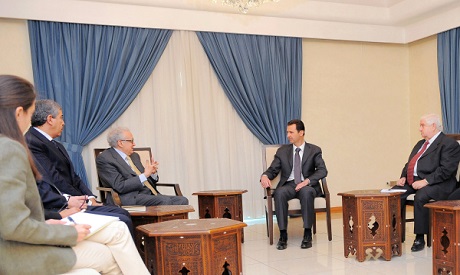
In this photo released by the Syrian official news agency SANA, Syrian President Bashar Assad, second right, meets with U.N.-Arab League envoy for Syria, Lakhdar Brahimi, center, in Damascus, Syria, Wednesday, Oct. 30, 2013 (Photo: AP)
Israel has reportedly bombed a Syrian base to halt an arms shipment to Hezbollah, while the international Syria envoy said Friday there could be no peace talks without the opposition.
The reported air strike on a military base in regime stronghold Latakia on Wednesday would be the first Israeli strike on Syria since a US-Russian accord on chemical weapons averted punitive US military action last month.
Israel did not comment on the reports that emerged late Thursday, but it has struck Syria in the past and warned it will continue to take action to prevent sophisticated weapons from falling into the hands of Hezbollah -- a key Damascus ally -- and other militant groups.
Saudi-owned Al-Arabiya television said Israel had targeted a shipment of surface-to-surface missiles destined for Hezbollah, the powerful Lebanese Shiite movement fighting alongside the regime.
A US official confirmed to AFP that "there was an Israeli strike" but gave no details on the location or the target, while Israeli officials refused to comment.
Syria, which has cooperated with international disarmament efforts, has vowed to retaliate against any attack but did not respond when Israel carried out two air strikes in May against what an Israeli official said were Iranian weapons destined for Hezbollah.
Hoping to build on the momentum of last month's US-Russian accord to destroy Syria's chemical arsenal by mid-2014, UN-Arab League envoy Lakhdar Brahimi has meanwhile been criss-crossing the region to rally support for the so-called Geneva II talks.
But Syria's deeply divided opposition has refused to attend unless President Bashar al-Assad's resignation is on the table -- a demand rejected by Damascus -- and powerful rebel groups have warned that anyone attending the talks will be viewed as a traitor.
"If the opposition does not participate there will be no Geneva conference," Brahimi told reporters in Damascus before returning to Beirut.
The veteran Algerian diplomat, who met with Assad on Wednesday, said the government had agreed to take part in the talks and that the opposition was "trying to find a way to be represented".
The main opposition National Coalition plans to meet November 9 to decide whether to attend the Geneva talks, but at least one key member of the bloc, the Syrian National Council, has said it will leave the umbrella group if it does so.
The reports on Thursday of the Israeli strike came as the Organisation for the Prohibition of Chemical Weapons said all of Syria's chemical arms were under "tamper proof" seals.
Some 1,000 tonnes of chemical agents and 290 tonnes of chemical weapons "have been placed under seals that are impossible to break," OPCW spokesman Christian Chartier said Thursday.
The OPCW also said Syria's chemical arms production equipment had been destroyed.
Inspectors had until Friday to destroy all production and filling equipment in accordance with a timeline laid down by the OPCW and a UN Security Council resolution.
The resolution, stating that the arsenal must be destroyed by mid-2014, followed a US-Russian deal to avert military strikes on Syria after chemical weapons attacks near Damascus in August that killed hundreds of people.
The West blamed those attacks on Assad's regime, which denied all responsibility.
The United States was "increasingly confident" the chemical arsenal would be eliminated by June 30, said Thomas Countryman, a senior State Department official in charge of non-proliferation issues.
IHS Jane's, a defence consulting firm, hailed the OPCW "milestone" but cautioned the work was far from over, noting Syria's entire arsenal was still under regime control.
"This is a very hurried process that has significant and real uncertainty associated with it. Only when the weapons are destroyed or removed from Syria will it be complete," IHS Jane's director for aerospace and defence consulting David Reeths told AFP.
More than 120,000 people have been killed in the 31-month rebellion against the Assad regime triggered by his bloody crackdown on Arab Spring-inspired democracy protests.
The Syrian Revolution General Commission said Friday that regime forces had seized the town of Sfeira in Aleppo province after a 27-day siege, and activists said rebels had completely withdrawn.
The army maintains several arms factories in the area.
Short link: